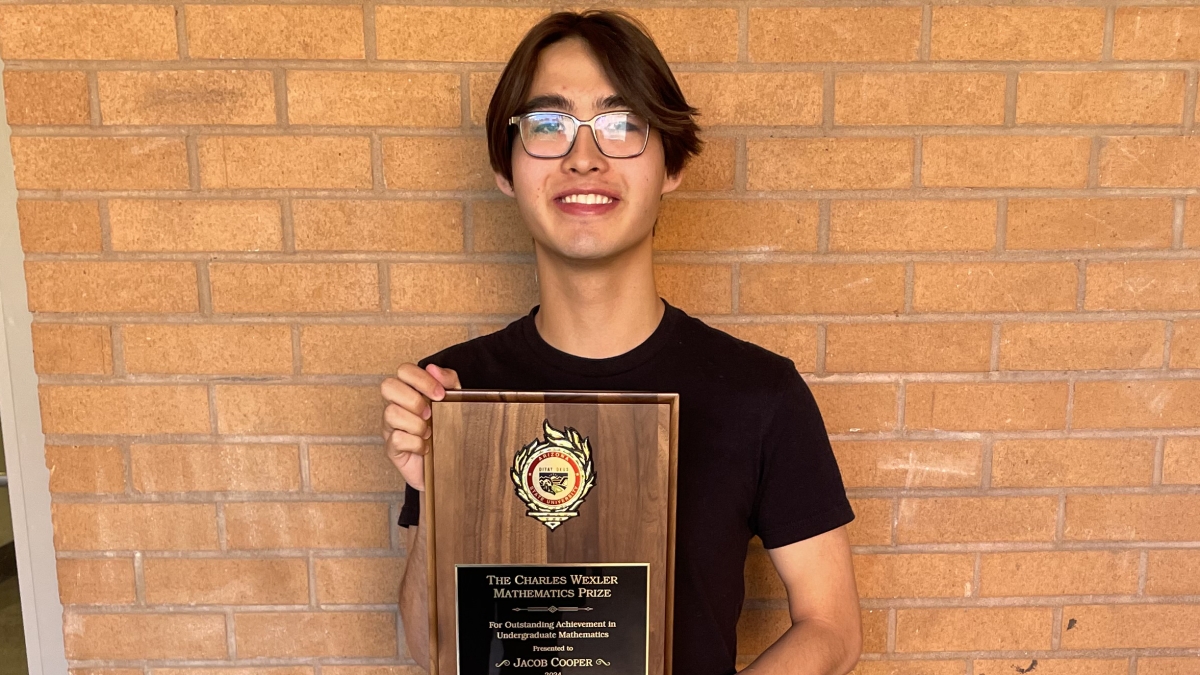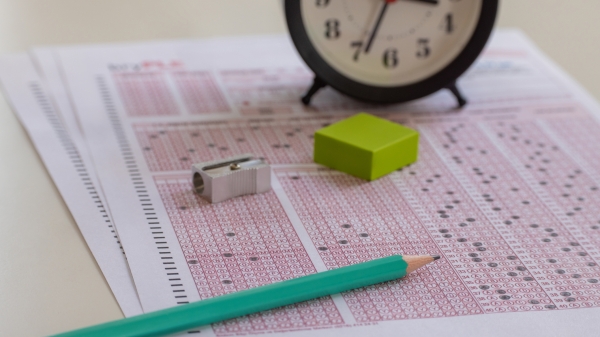Charles Wexler prize recipient finds passion for math at ASU

Jacob Cooper is the recipient of the Charles Wexler Mathematics Prize, the highest honor an undergraduate in the School of Mathematical and Statistical Sciences can receive. He is graduating with a Bachelor of Science in mathematics this May and plans to pursue a PhD in mathematics at ASU next.
Editor’s note: This story is part of a series of profiles of notable spring 2024 graduates.
Jacob Cooper initially enrolled as a computer science major at Arizona State University, but after taking MAT 300 just out of curiosity, he felt a spark of interest in mathematics so strong he decided to switch majors.
This month, Cooper is graduating with a Bachelor of Science in mathematics and was selected as the recipient of the Charles Wexler Mathematics Prize, the highest honor an undergraduate in the School of Mathematical and Statistical Sciences can receive.
“It feels incredibly mind-blowing,” said Cooper. “I remember when I first joined the math program, texting my friends back home that I was scared, and that I wasn’t sure if I was going to be able to integrate myself into the community, since I had such a hard time in the computer science program.
“But over time, I found that it was a really wonderful community of incredibly talented mathematicians, all of whom I think would have been great recipients for this award.”
Cooper, who grew up in Flagstaff, Arizona, hadn’t had the best grades in high school and was worried he wouldn’t meet the GPA requirements of many scholarships. He discovered that ASU allowed students to qualify based on test scores and was pleased to be accepted with a President’s Scholarship.
Assistant Professor Malena Español first met Cooper in her numerical analysis course, where he received an A-plus. As part of the course, he worked on an interdisciplinary team of four on a final project titled “Audio Classification.”
“Jacob's exceptional performance in my numerical analysis course exemplifies his outstanding qualities as a student and a team member,” said Español. “He excelled academically with his strong computational and mathematical skills and demonstrated exceptional collaboration skills in his interdisciplinary team's final project on 'Audio Classification.'
“Jacob's ability to communicate effectively and contribute insightful ideas significantly enhanced the learning experience for his peers. His dedication to both academic excellence and fostering a supportive learning environment makes him a truly remarkable individual.”
Cooper took advanced linear algebra with Assistant Professor Jonathan Montaño, where he earned another A-plus grade. Cooper approached Montaño last August asking if he could join fellow undergrad Ethan Leventhal in his Barrett honors thesis project on the multidegrees of binomial edge ideals, which is work that connects graph theory and algebraic geometry.
“I explained to him that Ethan had already spent a semester learning the prerequisites for the project, but Jacob did not shy away from the challenge,” Montaño said. “This reflects Jacob’s strong commitment and work ethic. They have been working together since then and have made important progress. They have already obtained good results that in my opinion are publishable.”
Cooper also worked with other faculty members, including Assistant Professor Molly Simon on science identity and sense of belonging in an introductory geology course, and served as a grader and instructional aide for a number of math courses.
Last summer he worked with the Joaquin Bustoz Math-Science Honors Program as a class supervisor. He managed four tutors and 25 students while working alongside Associate Teaching Professor Frank Arthur. Program manager Cynthia Romero explained that students in the program — which allows high school students to take a college-level mathematics or science course at ASU at no cost — are “underrepresented in STEM, first-generation collegebound and/or from low-socioeconomic households.”
“They can often feel overwhelmed due to being away home, culture shock of being at a large university or the high level of academic rigor,” Romero said. “Jacob created a fun and inclusive class environment full of music, cat memes and inspirational talks that helped him establish trust with his students. Jacob focused on both the student's mental well-being in addition to their academic success.”
After graduation, Cooper plans to pursue a PhD in mathematics at ASU. We asked him to share more about his journey as a Sun Devil.
Question: What’s something you learned while at ASU — in the classroom or otherwise — that surprised you, that changed your perspective?
Answer: I was always really intimidated by professors, and while it’s silly, it surprised me just how human they were. They all have fun stories and are so interesting to get to know, and have such wonderful insight and experiences.
Q: What’s the best piece of advice you’d give to those still in school?
A: Be nice to yourself and find ways to take little steps forward. Failure is inevitable, and it’s impossible to be perfect.
Q: What is most misunderstood about mathematics by the general public?
A: A lot of people think math is about finding the correct answer, and I think that is because of how it’s taught. But I think that it’s the opposite: Math is about exploring all the ways to do the same thing, and how those changes in perspective change your way of thinking.
Q: What was your favorite spot on campus?
A: The rooftop of PSH (Bateman Physical Sciences Center, H-wing) while observing the stars.
Q: Which clubs, activities, or community service projects are you involved in?
A: I am currently the treasurer of the Astronomy Club at ASU, and I’ve done a considerable amount of hours volunteering for outreach events for them. I also served as secretary/treasurer for the Math Bio Club, was an active member of the ASU Student Chapter of the Association for Women in Mathematics, and helped found the Scholars of Physical Mathematics, which aims to bring together students of both disciplines. My proudest activity was being a class supervisor and lead tutor for the Joaquin Bustoz Math-Science Honors Program.
Q: What do you like to do in your spare time?
A: Music is really important to me, and sometimes when I was bored (or procrastinating) on campus, I would find my way into the practice rooms in the music hall to play piano. I also enjoy playing with my two cats. I also try to find time to play games with my friends.
Q: If someone gave you $40 million to solve one problem on our planet, what would you tackle?
A: Education is a human right, and I would want to use that money to try and make education more accessible. I think that there are a lot of people who would excel in academia and have an amazing time in college, but can’t because the costs and barriers are too high.
Q: What were your favorite memories of your time in the School of Mathematical and Statistical Sciences?
A: Working as an IA for Associate Teaching Professor Beth Schlenker and trying to spread enthusiasm for math to the business students. Taking MAT 371 with President’s Professor Matthias Kawski, and making my first friends in the math department. Going to Coffee Break and socializing when my schedule wasn’t in the way. Attending lectures for my first graduate-level class with Associate Professor Julien Paupert. Attending the 2022 and 2023 AWSiM conferences. Volunteering for the school during Open Door and the Homecoming Block Party. …
I really couldn’t have asked for a better experience (at ASU). … This department is full of so many incredible people and mathematicians, and I see just how much effort and passion we all have for math. As much as I love math, I don’t think that it’s worth anything without the human aspect, and without the connection it brings to those who enjoy it.
More Sun Devil community

Tested tips for taking exams
With May quickly approaching, many students are starting to prep for their most important tests of the year — final exams.Toni Miceli, the inaugural director of the bar exam success program at…

School of Transborder Studies celebrates 15th anniversary
During the summer before his freshman year at Arizona State University, Salvador Macias participated in the AGUILA Youth Leadership Institute, a college access organization designed to help young…

Barrett program unlocks study abroad for first-year honors students
Twenty first-year students from Barrett, The Honors College at Arizona State University are spending their second semester studying abroad in Rome, Italy.Traveling in a tight-knit honors community…

